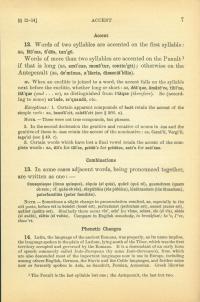12. Words of two syllables are accented on the first syllable.
Rō'ma
fi'dēs
tan'gō.
Words of more than two syllables are accented on the Penult1 if it is long.
amī'cus
monē'tur
contin'git
Otherwise on the Antepenult.
do'mĭnus
a'lăcris
dissociā'bĭlis
a. When an enclitic is joined to a word, the accent falls on the syllable before the enclitic, whether long or short.
dĕă'que
ămārĕ've
tĭbĭ'ne
ită'que (and ... so)
As distinguished from
i'tăque (therefore)
also, (according to some)
ex'inde
ec'quando, etc.
Exceptions:
-
-
Certain apparent compounds of faciō retain the accent of the simple verb.
benefă'cit
calefă'cit (see § 266.a).Note— These were not true compounds, but phrases.
-
In the second declension the genitive and vocative of nouns in -ius and the genitive of those in
-ium retain the accent of the nominativeCornē'lī
Vergi'lī
inge'nī (see § 49.c). -
Certain words which have lost a final vowel retain the accent of the complete words
illī'c for illī'ce
prōdū'c for prōdūce
sati'n for sati'sne.
-

